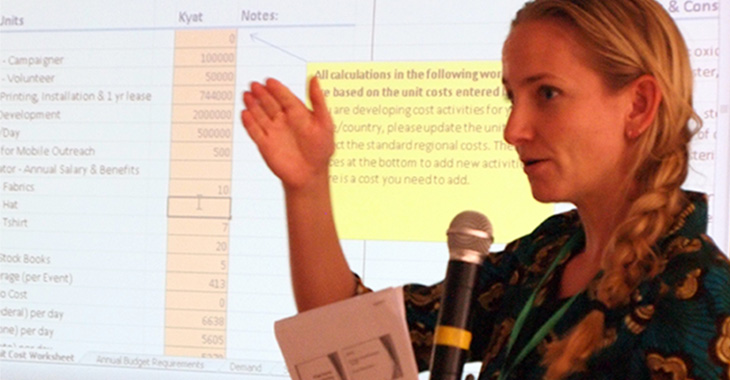The Health Policy Project ended in 2016. Work continued under Health Policy Plus (HP+) until 2022.
NEWS & VIEWS

Health Policy Project
By Nichole Zlatunich, PhD, Senior Program Advisor, Health Policy Project, Futures Group
KAMPALA, Uganda--Uganda has been a second home to me since my first trip to the country in 2007. I have spent several years in total since then living in Kampala, and have closely followed the politics of sexual and reproductive health and rights in Uganda, making it the subject of my PhD dissertation. Partially because of this, I feel the politics in Kampala even more deeply than those in the United States, although my work takes me to many countries.
I am currently in Uganda working on an activity of the USAID-funded Health Policy Project (HPP) to support the Ministry of Health (MOH). We are helping the MOH develop a “costed implementation plan” for family planning – a strategy to cost the government’s broad goals to scale up family planning programming between 2015 and 2020. From July 28-30, our team attended the National Conference on Family Planning in Kampala to make a brief presentation about the costed implementation plan to the over 500 conference attendees, and to consult with district-level representatives from across Uganda who were gathered in Kampala to attend the conference. Between sessions and catching up with colleagues over tea breaks, I caught myself reflecting on how much in has changed in Uganda.
In July 2010, I left the 15th session of the Assembly of the African Union Heads of State and Government, which was also held in Kampala, feeling quite pessimistic about President Museveni’s view on family planning. At that event, the Ugandan president said, “The population of Uganda is now 32 million and its growing fast. We are encouraging family planning in the form of spacing children, but we have never said that women should not have many children… I myself, I have not really been convinced that population is the main problem of Africa.”
The recent National Family Planning Conference took place almost four years to the day that Museveni made that remark in 2010. However, between 2010 and today, the president’s stance on family planning and population has evolved considerably. As he said in his opening speech for the conference, “We are all now speaking one language.” Further, President Museveni endorsed family planning as a major component of “a holistic package” for development, which he named as also including health, education and infrastructure development.
I left the closing ceremony on with a skip in my step and President Museveni’s words still ringing in my head: “Family planning is good for the health of the mother, good for the health of the children. It [family planning] is good for the welfare of the family; [it] is good for the welfare of the country.”
This change in political leadership for family planning was invigorating to many of us in attendance. The energy of those in attendance was a palpable—colleagues told me that they felt re-energized, refreshed, and ready to translate these commitments from Uganda’s highest leadership into action.
How had this shift happened? The political leadership for family planning emerging in Uganda came about only after years of advocacy from national stakeholders such as Dr. Jotham Musinguzi, the Regional Director for PPD ARO, a partner on the Health Policy Project. The global family planning movement has also been reinvigorated in recent years following the London Summit, which resulted in countries (including Uganda) making pledges through Family Planning 2020 (FP2020), which aims to enable 120 million more women and girls to use contraceptives by 2020.
The work in countries like Uganda has only begun—even with a good technical plan for family planning and strong leadership from the Ministry of Health, commensurate resources need to be allocated (and released) from both the government and donors. And to ensure that change comes to the lives of the men and women who need family planning and reproductive health services, accountability needs to become more than a slogan.
What's New
- Something to Build On: “Innovation Exchange” Celebrates the Health Policy Project’s Close and a New Beginning
- What Will it Take for Tanzania to Achieve ART Targets and Ensure Long-Term Sustainability of the HIV Response?
- Helping Kenya’s County Leaders Advocate for Increased Health Investments
- HPP Holds Working Meeting on Ensuring Responsible PEPFAR Transitions for Key Populations
- Health Policy Project Celebrates 2016 International Women's Day
- HPP Staff Participate in White House Conference on HIV Stigma Reduction

